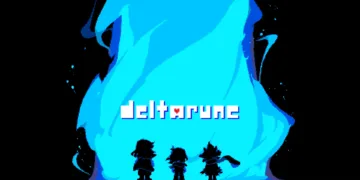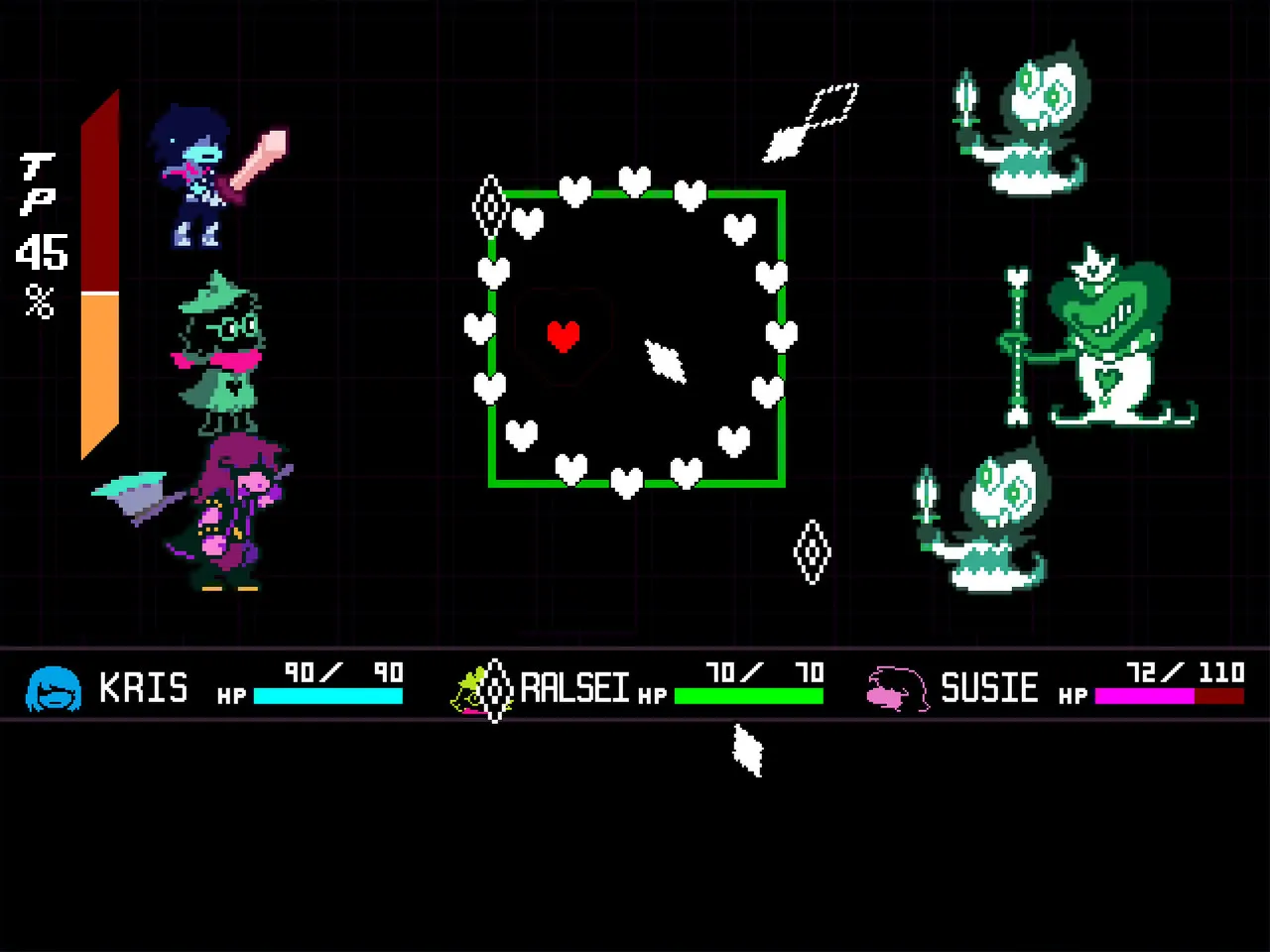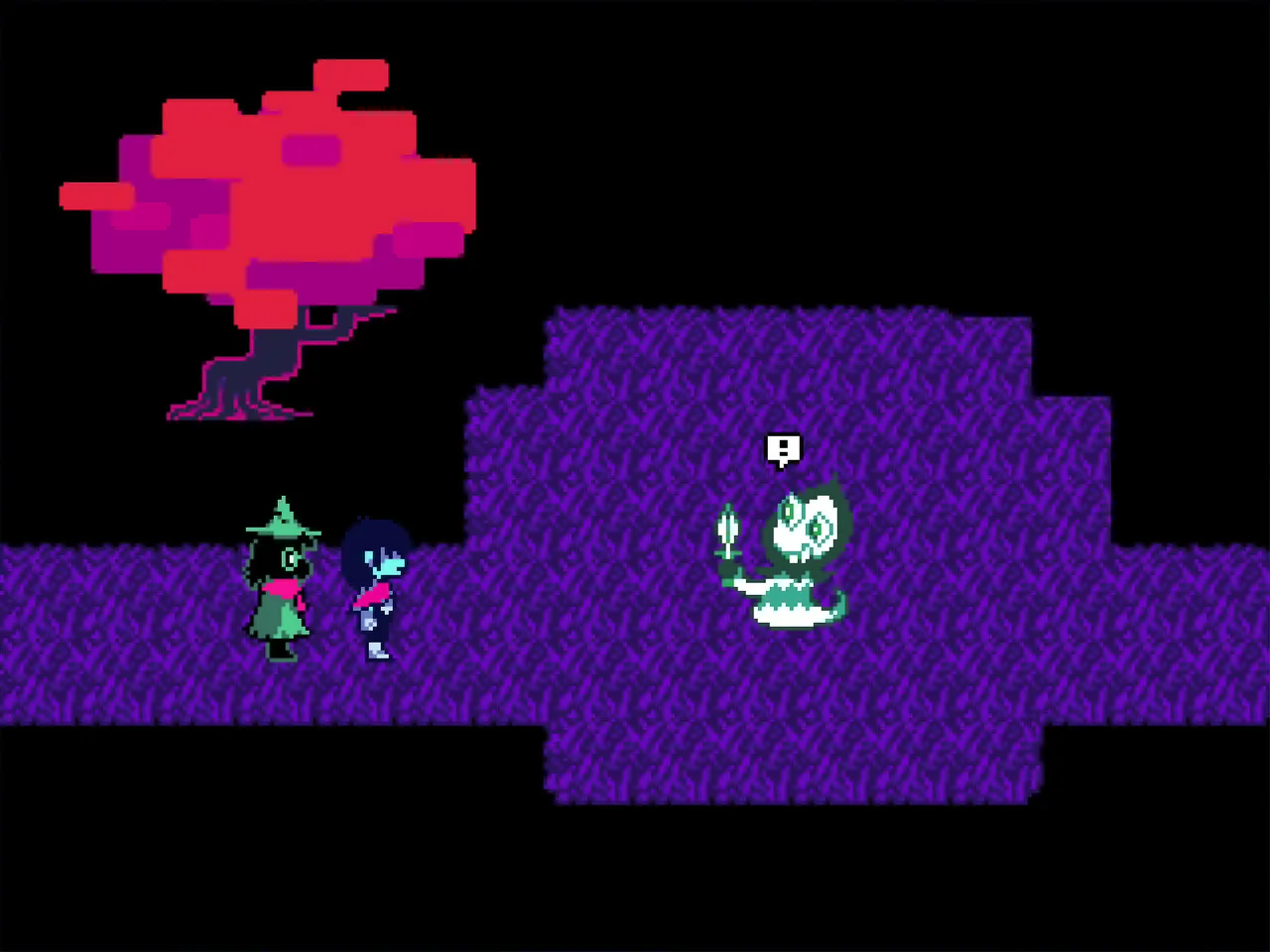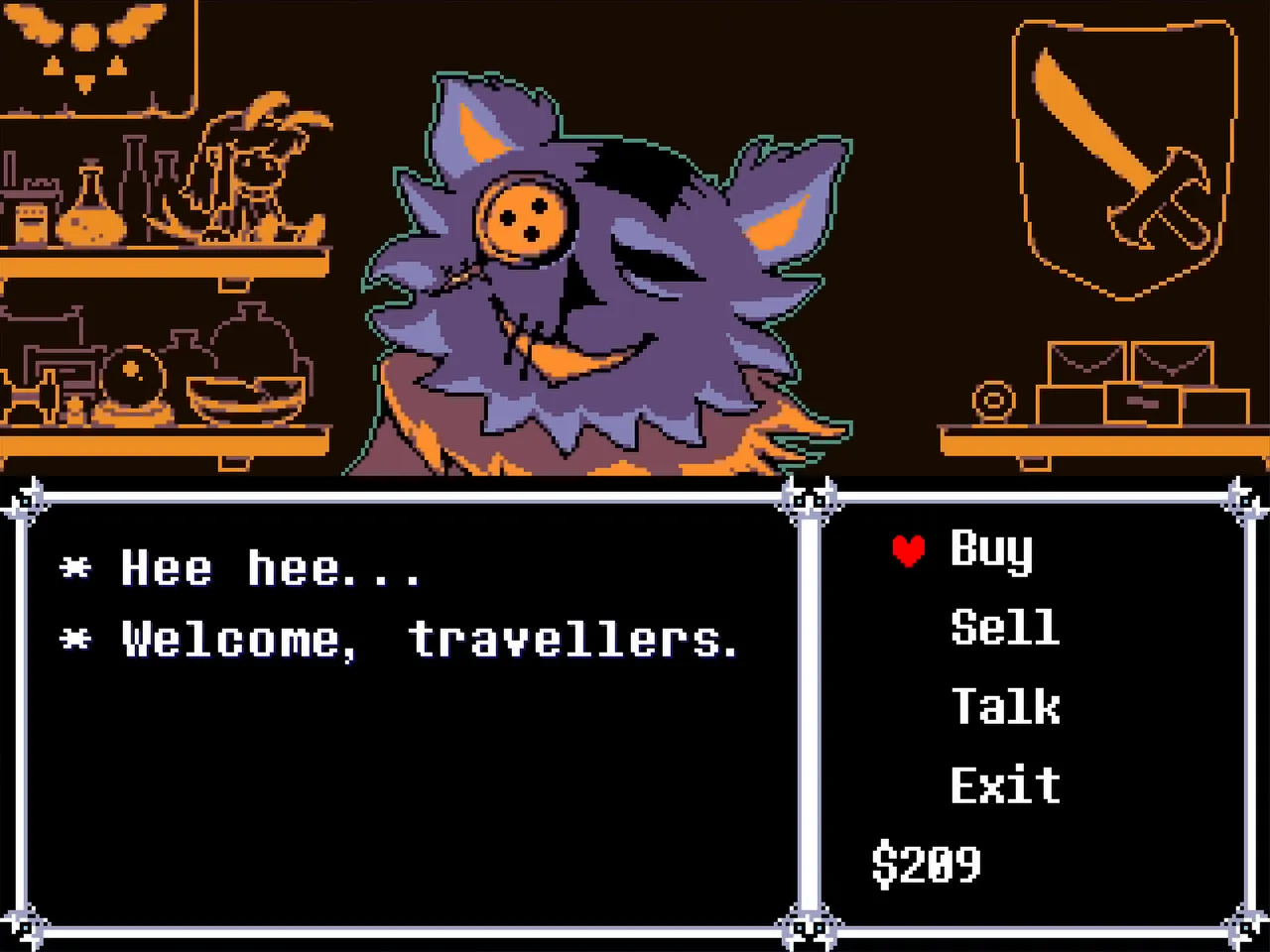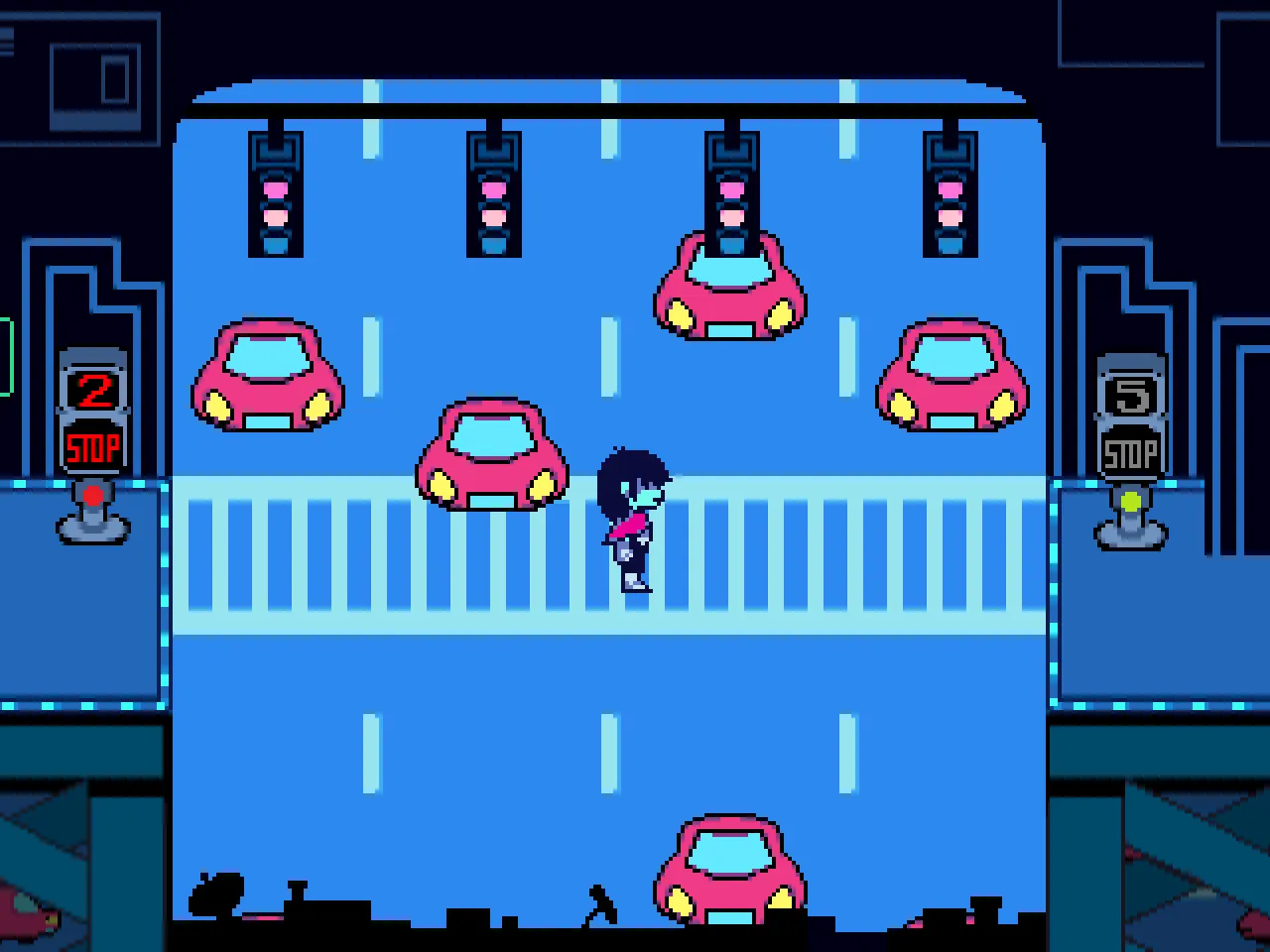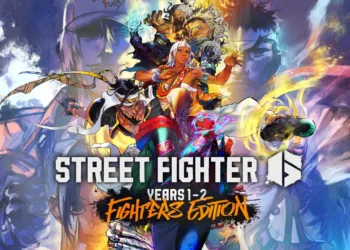The adventure begins not with a grand cataclysm, but with the quiet mundanity of a school day. You are Kris, a human teenager living as the quiet outlier in a peaceful town populated by monsters. Life’s biggest challenges seem to be staying awake in class or navigating the awkwardness of your adoptive family.
That is, until you and the school’s resident delinquent, Susie, are sent to fetch chalk from a supply closet and are unceremoniously pulled into a different reality. You land in a “Dark World,” a fantasy kingdom made from forgotten classroom objects, where you are suddenly declared a prophesied hero destined to restore balance to the world.
This setup immediately establishes the game’s signature style, which will feel familiar to anyone who has played its predecessor, Undertale. While Deltarune exists as a parallel story, not a direct sequel, it shares that same spirit of subverting RPG expectations with clever, heartfelt, and often absurdly hilarious writing.
The simple pixel-art aesthetic belies a world humming with intrigue and mystery, one that constantly plays with the player’s understanding of their role. It presents a classic hero’s tale on the surface, only to hint at a much deeper and more unsettling story just waiting to be uncovered.
The Art of the ACT: A New Kind of Conflict
At first glance, Deltarune’s combat appears to follow the classic JRPG blueprint. You command a three-person party—Kris, Susie, and the gentle prince Ralsei—using familiar turn-based commands like Fight, Item, and Defend. However, this traditional foundation is merely the stage for a much more inventive system.
When enemies attack, the game shifts into a bullet-hell sequence where you must guide a small heart representing your character’s SOUL, dodging intricate patterns of projectiles within a confined box. This defensive phase demands active participation, but it also rewards skillful play through the “Graze” mechanic. By narrowly avoiding attacks, you build a Tension Points (TP) meter, which is essential for unleashing powerful magic and special abilities, creating a compelling risk-reward loop in every exchange.
The true genius of the combat, however, lies in the “ACT” command, a system that transforms every encounter from a simple brawl into a unique puzzle. Rather than just fighting, you can interact with enemies in specific, often hilarious ways to de-escalate the conflict. You might need to warn an enemy that Susie is about to attack against your orders, flirt with a foe to make them spare-able, or figure out the bizarre needs of an ambulance-themed monster who responds differently to each party member.
Successfully pacifying enemies has tangible benefits beyond just ending a fight; these former foes will relocate to your party’s hub, the Castle Town, populating it with new faces and shops, directly linking your actions in battle to the growth of your world.
This system fosters a deep sense of party synergy where each member’s personality is woven into the strategy. Early on, Susie acts on her own, defaulting to violence regardless of your commands. This isn’t a bug, but a brilliant mechanical representation of her rebellious nature, forcing you to strategize around her. You must use Kris and Ralsei to manage the situation, turning battles into a delicate dance of de-escalation.
As the party grows, you learn to combine their skills—using Kris to ACT and set up an enemy, allowing Ralsei to use his Pacify spell on the same turn. It’s a combat system that is less about brute force and more about understanding, empathy, and creative problem-solving.
A Tale of Light and Dark: Narrative and Themes
The narrative structure of Deltarune is built upon a fundamental contrast between two distinct realities. There is the “Light World” of Hometown, a place of quiet, almost melancholic normalcy where familiar monster faces from Undertale live out ordinary lives as teachers and shopkeepers. Then there are the “Dark Worlds,” fantastical realms born from the mundane.
A forgotten classroom with plush carpets becomes a vast, vibrant forest; a school’s computer lab transforms into a sprawling cyberpunk city built from old advertisements. This duality creates a compelling rhythm, grounding the fantastical journey in a relatable, everyday setting while allowing for immense creative freedom in its level design and world-building.
This journey is initially framed by a classic RPG prophecy. Ralsei informs Kris and Susie that they are the destined “Heroes of Light,” tasked with sealing Dark Fountains to prevent the world’s destruction. However, the game quickly begins to deconstruct this straightforward premise. The narrative is seeded with mysteries and unsettling moments that challenge the player’s role.
The most potent of these is the theme of control. At the end of key chapters, control is wrested from the player as Kris acts on their own, their motives unclear and their actions disturbing. This creates a fascinating meta-narrative that questions the very nature of player agency in video games, suggesting your heroic actions might just be one part of a much larger, and perhaps less benevolent, plan.
The game’s episodic structure enhances this slow burn of mystery. Each chapter introduces a new Dark World with its own bespoke theme, cast of characters, and even unique gameplay mechanics, like the series of amusing minigames that break up the combat in Chapter 3.
This format allows each installment to feel like a self-contained adventure while steadily advancing the overarching plot and deepening the central questions. Rather than feeling disjointed, this approach builds narrative momentum, ensuring that with each new chapter, the stakes feel higher and the desire to understand what is truly happening in this strange world becomes more intense.
Presentation: Expressive Pixels and Unforgettable Melodies
Deltarune employs a pixel-art aesthetic that, like its predecessor, is simple by design but remarkably effective in practice. The visuals lean into an EarthBound-like surrealism where the charm lies not in technical prowess but in sheer creativity and expression.
Character sprites are animated with personality, and the detailed portraits that accompany dialogue convey a huge range of emotion and humor, ensuring every interaction feels lively. While the overall look is rudimentary, the game carefully reserves moments of visual flair—higher quality splash art or more fluid animations—for key narrative beats, giving them significant impact when they appear.
This confidence is also apparent in its sight gags; a character like Tenna, a game show host with a TV for a head, intentionally clashes with the world around him, speaking in goofy WordArt that makes his appearances comedically jarring.
The soundtrack, personally composed by creator Toby Fox, is an essential pillar of the experience. It does much of the heavy lifting in setting the tone, shifting seamlessly from pounding, high-energy chiptune battle themes that build incredible tension to surreal, ambient tracks that give exploration a dreamlike quality. The score is as varied as it is memorable, even incorporating live piano to lend a raw, emotional weight to the story’s most heartfelt moments.
What elevates the music is its masterful use of leitmotifs. Recurring musical phrases are woven throughout the score, subtly linking characters, locations, and events. This technique creates a cohesive audio narrative that rewards attentive listeners and deepens the connection to the story, turning a great soundtrack into an indispensable storytelling tool.
The Heroes, Villains, and Goofballs of the Story
A story this eccentric lives or dies by its cast, and Deltarune’s characters are its strongest asset. The central trio of heroes undergoes significant development across the chapters. Kris serves as the player’s avatar, a silent protagonist whose choices you direct.
Yet, they remain an enigma, showing hints of their own personality and struggles that exist outside of your influence. Ralsei is the archetypal kind-hearted guide, but as the story progresses, his encyclopedic knowledge of the prophecy and his gentle demeanor become more mysterious.
The true standout, however, is Susie. She begins as a one-dimensional bully but evolves into a fiercely loyal and complex hero. Her journey from disinterested delinquent to enthusiastic adventurer is one of the most satisfying arcs, and she often feels like the story’s true protagonist, forging her own path and reacting to the absurdity of the Dark World with a mix of aggression and surprising heart.
The bond between these characters, particularly Kris and Susie, forms the comedic and emotional core of the game. Their dynamic is infectious; countless moments of exploration are made memorable by inspecting an object, being presented with a profoundly silly option, and having Susie immediately and excitedly encourage you to do it. This shared, joyful idiocy makes their growing friendship feel genuine and is a constant source of humor. They are, as one review aptly put it, a dumbass duo with joint custody of a single braincell.
This strong central cast is supported by a Royal Rumble of scene-stealing side characters and antagonists. From the comically inept puzzle-maker Rouxls Kaard to the chaotic secret bosses like Jevil and Spamton, each chapter introduces unforgettable personalities.
These figures are more than just obstacles; they are bursting with unique quirks and define the comedic tone of their respective worlds. Their presence ensures that every new area feels distinct and leaves you wondering how the next chapter could possibly top the antics of the last.
Final Thoughts on an Evolving Epic
Recommending an unfinished story can be a strange proposition, yet Deltarune makes a powerful case for itself. While the complete narrative may still be years away, the chapters currently available offer a substantial and deeply satisfying experience that stands confidently on its own.
The roughly 20 hours of gameplay are packed with phenomenal character work, exceptionally clever writing, and well-refined gameplay systems that build upon its predecessor’s foundation in exciting ways.
The adventure leaves off on a jaw-dropping, high-stakes moment that feels earned, creating a lasting impact. What has been delivered so far is an incredible achievement, leaving one reeling with theories and immense anticipation for where this strange, wonderful, and heartfelt story will lead next.
The Review
Deltarune
Deltarune is an extraordinary achievement, even in its incomplete state. It builds upon the foundation of its predecessor with more strategic combat, an unforgettable cast, and a story brimming with mystery, humor, and heart. The brilliant writing, phenomenal soundtrack, and inventive mechanics combine to create an experience that is emotionally resonant and consistently surprising. While the episodic nature means the final chapter is still out of reach, the journey so far is an essential, high-quality adventure that stands as one of the most creative RPGs available today.
PROS
- An exceptionally well-written cast of funny and endearing characters.
- Inventive combat that blends turn-based strategy with bullet-hell action.
- Consistently clever writing filled with memorable humor and surprising depth.
- A masterclass soundtrack that elevates every moment.
CONS
- The story is unfinished, with a significant wait for the final chapters.
- Simple pixel-art visuals may not appeal to all players.
- Some late-game areas can be lengthy to navigate.
